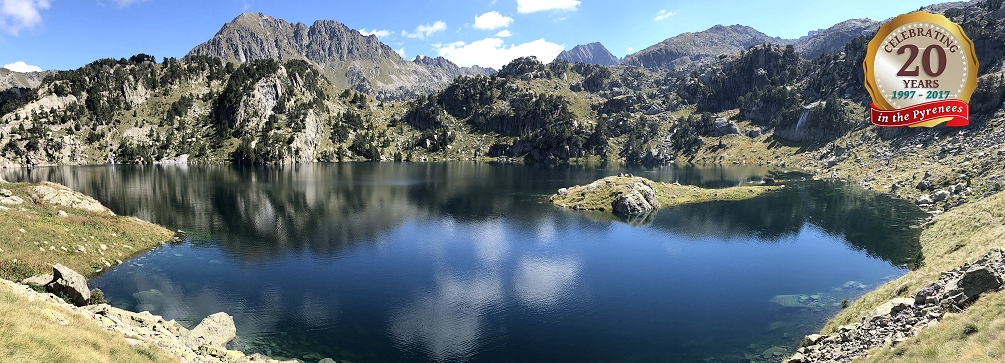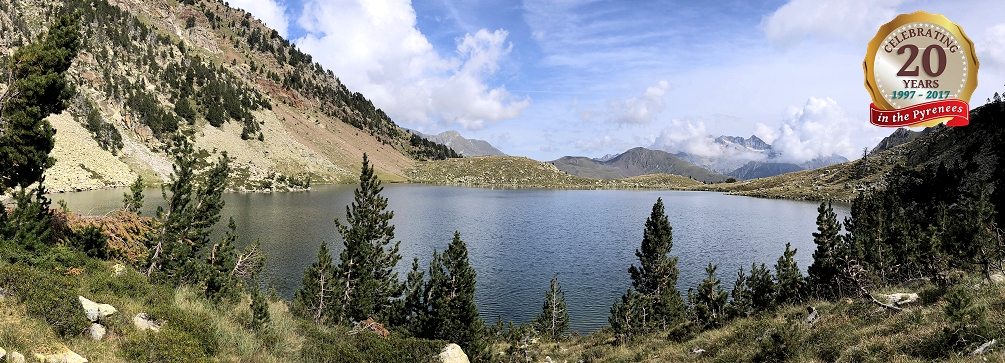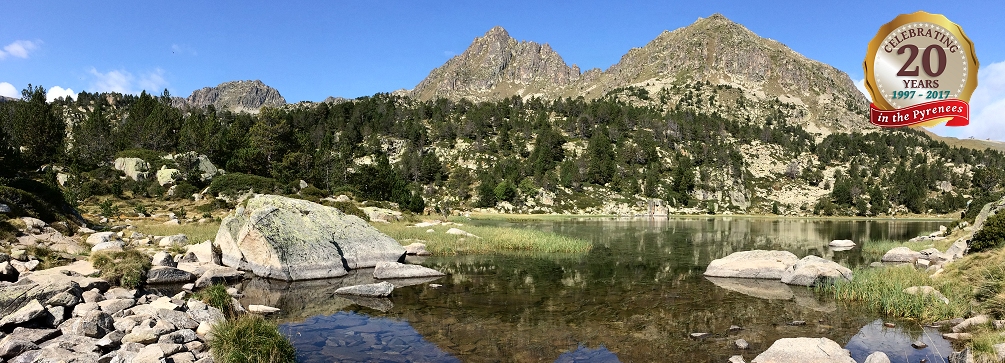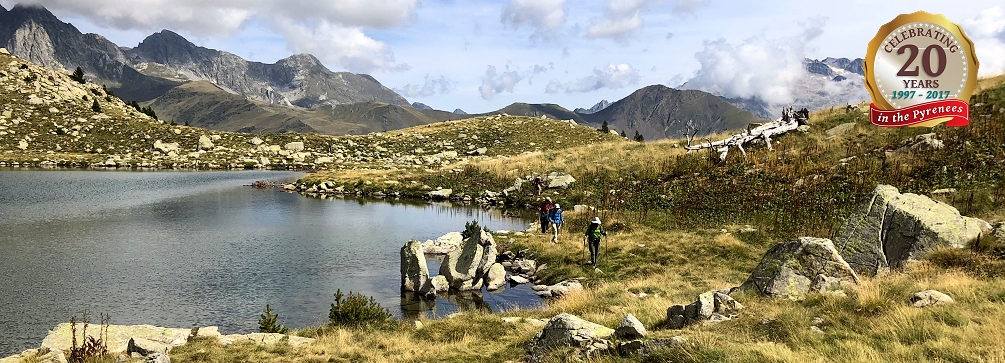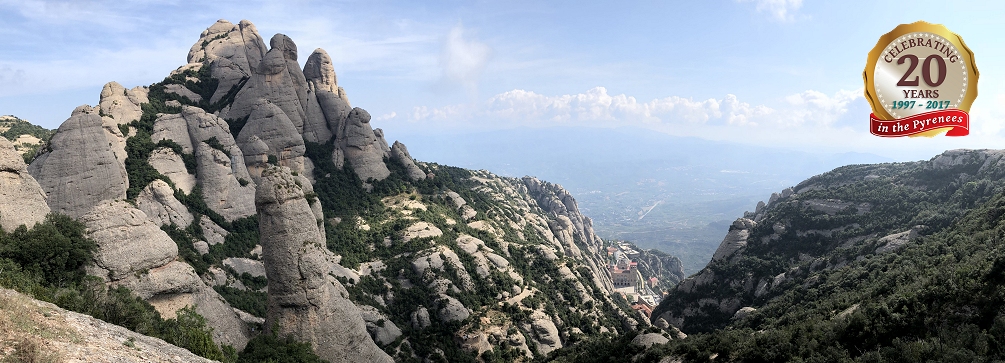Hiking the Spanish Pyrenees
Mountain Trails of Catalonia and Andorra

Printable version of trip itinerary
Traveling in Spain in 2024/2025: What to Expect
Pyrenees of Spain and Andorra Slide Show
Pyrenees of Spain and Andorra Slide Show for iPad and iPhone
Hiking the Spanish Pyrenees 2023 Video (at our YouTube channel)

For over twenty years we have been leading hiking trips in the Pyrenees, the mountain chain that stretches for three hundred miles along the border of France and Spain. To celebrate the twentieth anniversary of our first trip through these magnificent mountains we designed this hiking adventure featuring the national parks and protected areas on the Spanish side of the range. Enjoy mountain hikes in the sunny regions of Catalunya (Catalonia) and Aragon where Spanish nobility once summered, and wander the high-country trails of the tiny, mountain-ringed independent principality of Andorra. Spectacular lake-studded high country basins abound in places like the Aigues Tortes National Park and the Posets-Maladeta Nature Reserve. Here are classic mountain landscapes offering abundant, soul-lifting experiences for those of us who love the mountains. After a day on the trail, relax in comfortable inns where regional food and wines will refuel you. Start and end your Pyrenees hiking adventure in vibrant and sophisticated Barcelona, one of our favorite cities in Europe. Come join us on the trail and introduce yourself to some of the most splendid mountains Europe has to offer.

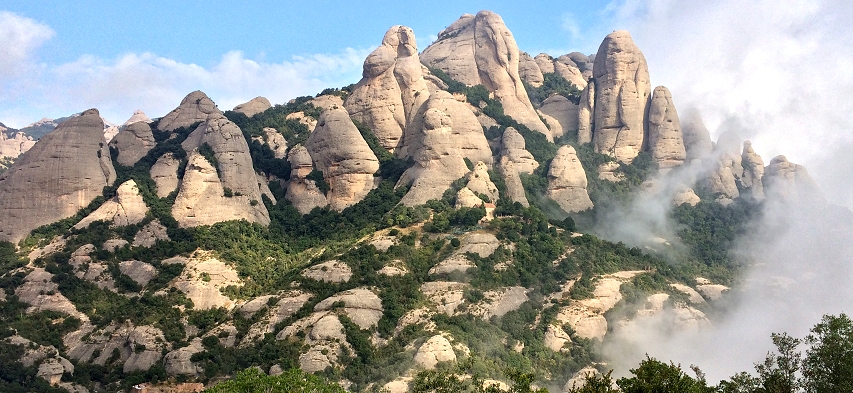
Pinnacles at Montserrat.
Day 1
Overnight in Andorra
Lunch and dinner included
Depart Barcelona this morning bound for the Benedictine Monastery of Santa Maria de Montserrat established originally in the ninth century and built on the site of an earlier Roman temple to Venus. Montserrat is today the most important pilgrimage site in Catalunya (Catalonia). The monastery is nestled among the knobby crags of Montserrat (“serrated mountain”) which since 1987 has been protected in a nature reserve established by the regional government of Catalunya. For the hiker, Montserrat is a visually striking introduction to the mountains of northeastern Spain. Its rugged contours call to mind the rocky spires of California’s Pinnacles National Park. From the monastery, a funicular provides access to a trailhead at the Pla de les Taràntules from where a trail will lead you to the summit of the peak of Saint Jerome (Sant Jeroni), the highest point in the Montserrat massif at 4,050 feet above sea level. From here on a clear day, you can see both the Pyrenees and the Mediterranean Sea. As usual, a choice of hikes will be offered on this day. Following the hikes at Montserrat, continue by vehicle into the Pyrenees. Spend your first night in the mountains in the independent principality of Andorra, a tiny, 180-square mile, land-locked country in the midst of the Pyrenees. It’s bounded by France to the north and Spain to the south. Though chartered in the tenth century, the principality of Andorra was established in the thirteenth century. Today it is under the leadership of two “co-princes” those being the President of France and the Catholic Bishop of Urgell (Spain). Andorra’s economy once revolved around tobacco growing and smuggling but today, the tourism and ski industries have taken center stage. In the high valleys of the country, some of the old Andorra still remains. Here you’ll find mountain hamlets, a treasury of humpbacked stone bridges that once linked isolated settlements, and sprawling high country flower fields accented by sparkling lakes.
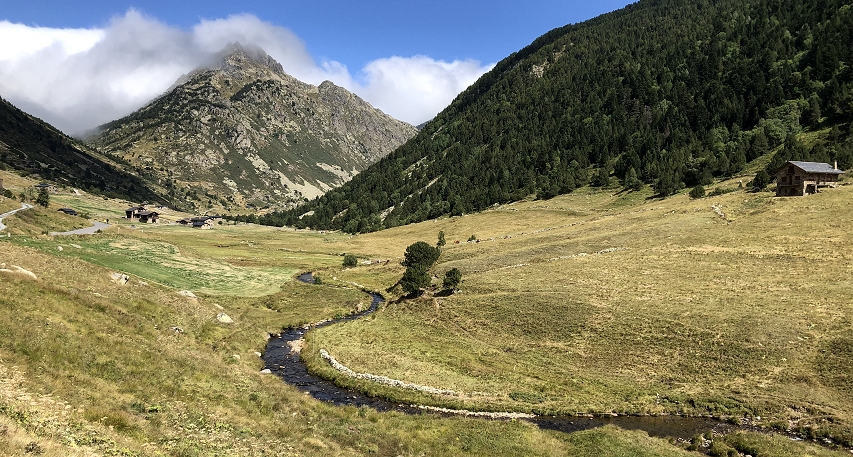
Peaceful Val d’Incles, Andorra.
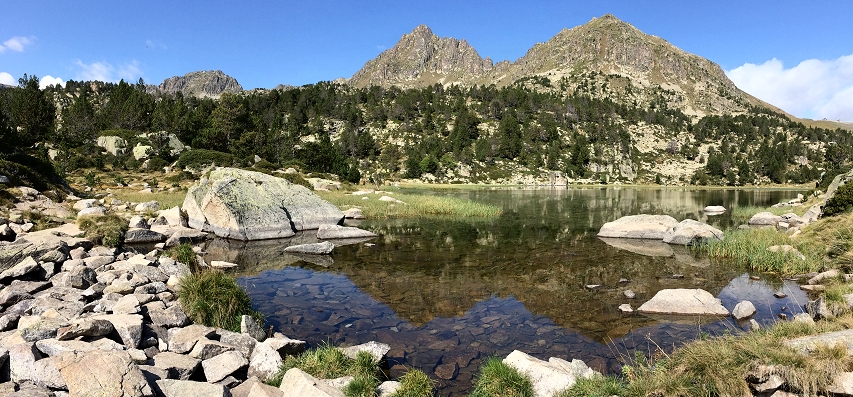
High country lake, Andorra.

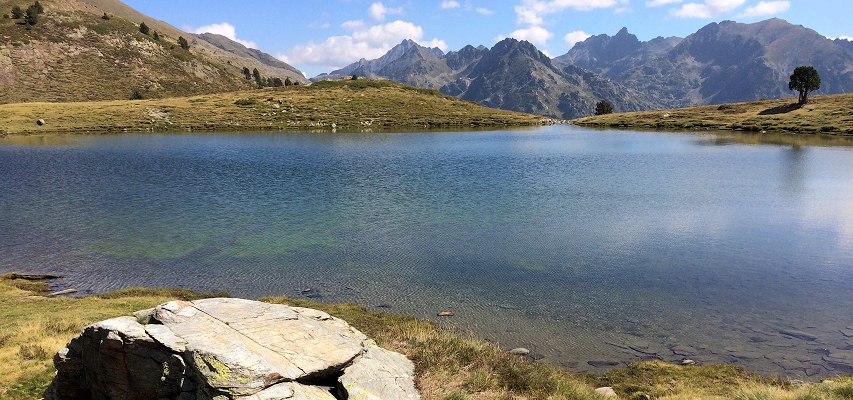
Meadow-ringed Estany Querol, Val d’Incles.
Day 2
Overnight in Andorra
Breakfast, lunch and dinner included
After breakfast, a short transfer by vehicle brings you to a trailhead in the Val d’Incles, one of Andorra’s relatively untouched mountain valleys. From the broad, open valley floor at the upper reaches of the Val d’Incles, a trail ascends through scattered groves of conifers to bring you to the mountain pass known as the Port d’Incles on the border between Andorra and France. From the pass you can gaze down on the serene waters of the Etangs de Fontargente, a pair of lovely alpine lakes nestled in a rocky bowl on the French side of the border. Retrace your steps to the starting point. If you desire, you can extend the hike by heading toward the Estany de Cabana Sorda, a mountain lake surrounded on three sides by mountain ramparts. (“Estany” is the Catalan word for “lake.”) Enjoy the peace of the Andorran high country before descending the western slopes of the Val d’Incles to trail’s end on the valley floor. Spend a second evening in Andorra.
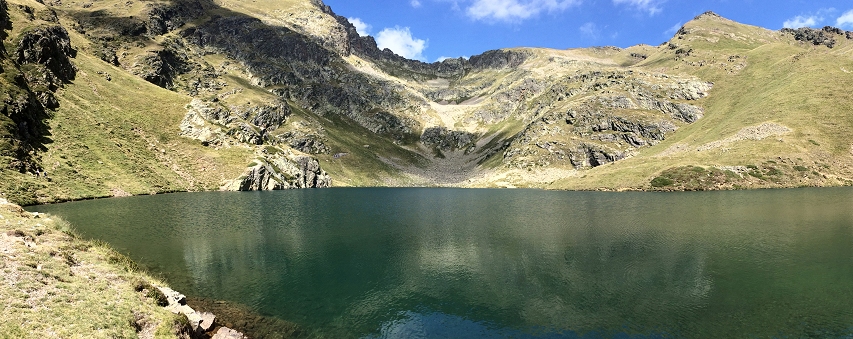
Estany de Cabana Sorda, Andorra.
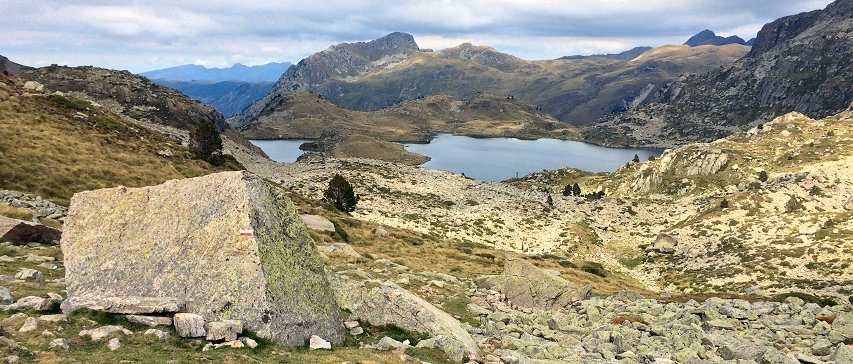
A view of the Etangs des Fontargente (in France) from the Port d’Incles.

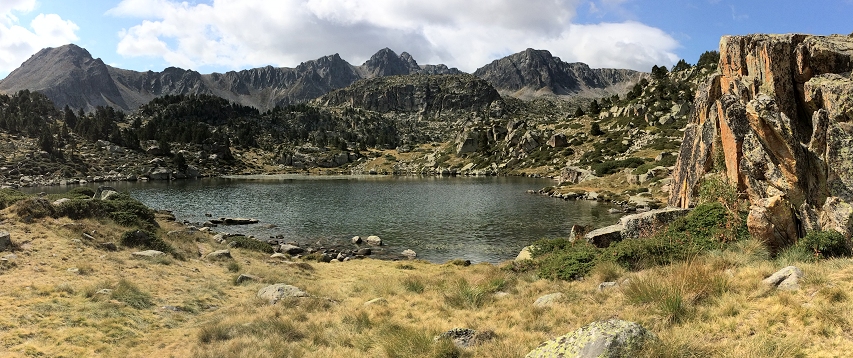
Estany Rodó in the Circ dels Pessons, Andorra.
Day 3
Overnight in Andorra
Breakfast, lunch and dinner included
Enjoy a second day of hiking in the mountains of Andorra. Shuttle by vehicle to the valley of Grau Roig. In the winter season, this is a popular location for skiing, but it’s quiet in the summer. Most of the valleys surrounding Grau Roig have been developed for skiing, but one of the valleys, known as the Circ dels Pessons, is a rocky basin spangled with alpine lakes. It’s well-suited for high country rambles in the summertime. You can complete a loop-hike past no less than eleven lakes. Those seeking a longer day on the trail can ascend the headwall of the cirque to reach the pass known as the Collado dels Pessons which offers expansive views over the entire Circ dels Pessons to the northeast and over the Ensagents Cirque to the west. Spend a third evening in the mountains of Andorra.

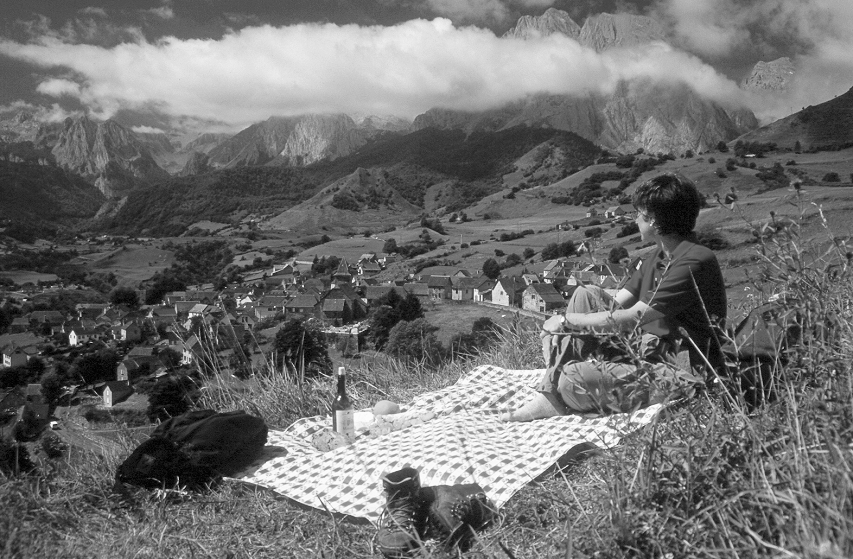
Here we are in our younger days reveling in the glory of the Pyrenees. Love at first sight!
Falling in Love with the Pyrenees
Our love affair with the Pyrenees began over a quarter century ago. We were young and enamored with the mountains (and we still are)! Over the years, we’ve journeyed across this three hundred mile long chain of peaks that serves as the gateway to the Iberian Peninsula. From the Atlantic to the Mediterranean, we explored the nooks and crannies of the range ascending twisting mountain roads to isolated high country villages. We once gave a ride to an old woman heading back to her village after a day with her goats in the high pastures. She filled our car with the aroma of goat’s milk, but that just added to our sense-surround experience of these wonderful mountains. We lounged in luxuriant meadows and toasted the peaks with a bottle of wine from lesser known appellations like Jurançon and Somontano. We lunched on fromage de brebis bought from a local farmer and enhanced with a slice of gâteau à la broche–a cake “baked” on a spit over a fire. Bliss! And, of course, the trails called. There are more than enough of them in the Pyrenees to last a lifetime of wandering. Here we discovered paths that led us through beech forests, along tumbling streams, and through rocky lake basins studded with sapphire-hued tarns. High on vertical canyon walls we picked our way along ledges (fajas) lined with edelweiss (flor de nieve) that led us into grand, wild mountain cirques where we saw no other human. Though the Pyrenees may not be as well known, or as well loved as the Alps, there is no doubt that these are mountains of the first order. They offer all the enchantments and joys that those of us who love the mountains seek. Come and fall in love with the Pyrenees!

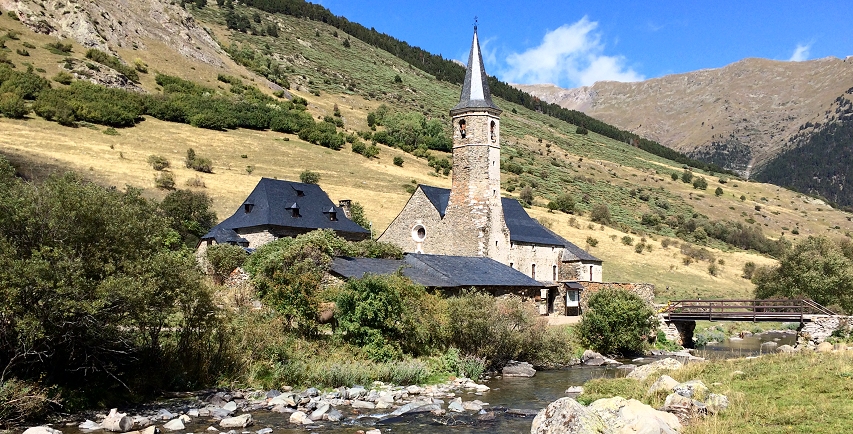
The Noguera Pallaresa River flows by the Sanctuary of Montgarri in its namesake valley.
Day 4
Overnight in the Val d’Aran
Breakfast, lunch and dinner included
Depart Andorra this morning bound for the Val d’Aran. Travel by vehicle down the valley of the Gran Valira River. Virtually all the waters of Andorra drain into this river which exits the country at its southwestern corner. Just past Andorra’s capital of Andorra la Vella, you’ll enter Spain and six miles later you’ll pass through the Spanish town of Le Seu d’Urgell (“the seat of Urgell”) at the confluence of the Gran Valira and Segre Rivers. Continue by vehicle over the Port de la Bonaigua, down to the resort village of Baqueira and up to the high pasturelands above the village. From here, begin a hike that descends the Vall de Montgarri following the course of the Noguera Pallaresa River to the isolated Sanctuary of Montgarri. After the hike, continue to the small village of Arties in the heart of the Val d’Aran, your home for the next three nights. Though the Val d’Aran lies on the French side of the Pyrenean watershed, it has long been under Spanish influence. The inhabitants of the Val d’Aran speak a separate language known as Aranès which exhibits elements of Gascon, Catalan, and Basque. The name “Aran” comes from the Basque word “haran” which means “valley” making the term “Val d’Aran” a bit redundant!
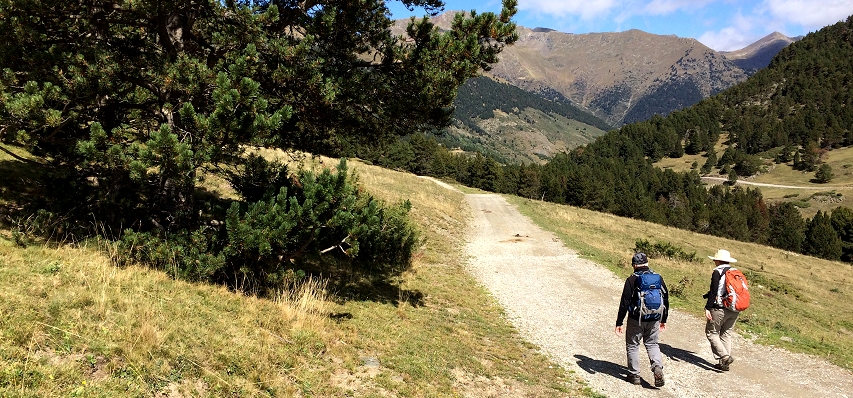
Hikers in the Vall de Montgarri.

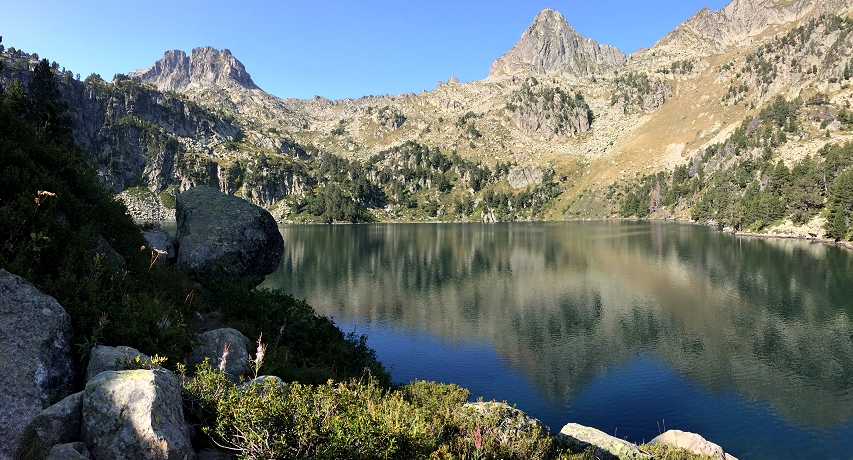
Estany Gerber.
Day 5
Overnight in the Val d’Aran
Breakfast, lunch and dinner included
Travel back across the Port de Bonaigua and descend a short distance to reach the trail that provides access to the wild and beautiful Gerber Valley. The trail leads past a few small lakes to reach the rock-ringed Lake Gerber, classically “alpine” in character! For a longer hike, you can continue beyond Lake Gerber to reach a higher, less frequented mountain basin spangled with glacial tarns. Here you’ll find the small, brightly painted Refugio Mataró which caps a large boulder next to the lake known as Estany de l’Illa (“Lake of the Island”). After the hikes, return to the Val d’Aran where you’ll spend a second evening.
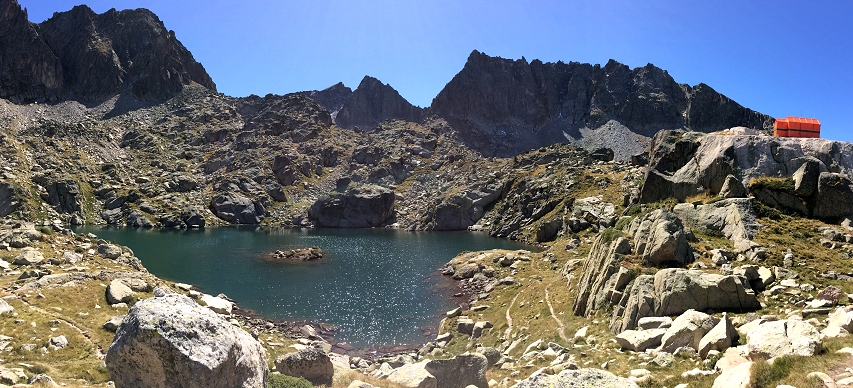
Refugio Mataró and the Estany de l’Illa.

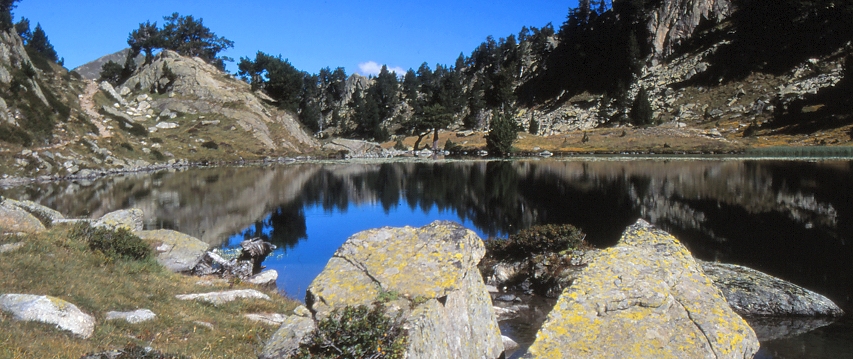
Estany Redo in the Circ de Colomers, Aigues Tortes National Park.
Day 6
Overnight in the Val d’Aran
Breakfast, lunch and dinner included
After breakfast, a vehicle transfer will bring you to the Banhs de Tredos in the valley of the Aiguamòg River. Follow a trail as it leads you into the lake-filled expanse of the Colomers Cirque (Circ de Colomers), one of the crown jewels of Catalunya’s Aigües Tortes i Estany de Sant Maurici National Park. Enjoy a loop hike through this alpine wonderland of gem-like tarns, chattering rivulets, boulder-strewn meadows and conifer-clad knolls enclosed by a ring of snow-flecked mountains. Energetic hikers can opt for a one-way hike across the park by first ascending to the pass of Ratèra de Colomers where views of the twin peaks known as Els Encantats (“the enchanted ones”) will delight. Legend says that these peaks are all that remains of two shepherds who decided to skip Mass and go hunting instead! From the pass, the trail winds down past a string of tarns to the large Estany de Sant Maurici (St. Maurice Lake) on the east side of the national park. A shuttle ride at the end of the hike brings you back to your hotel in the Val d’Aran.
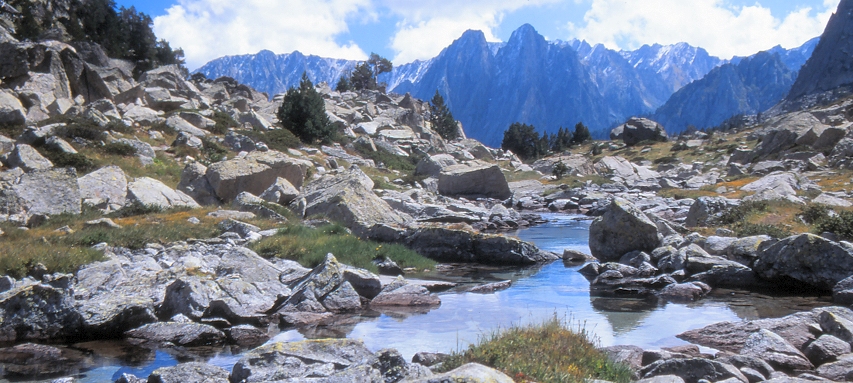
Aigues Tortes high country heading to Estany Sant Maurici.

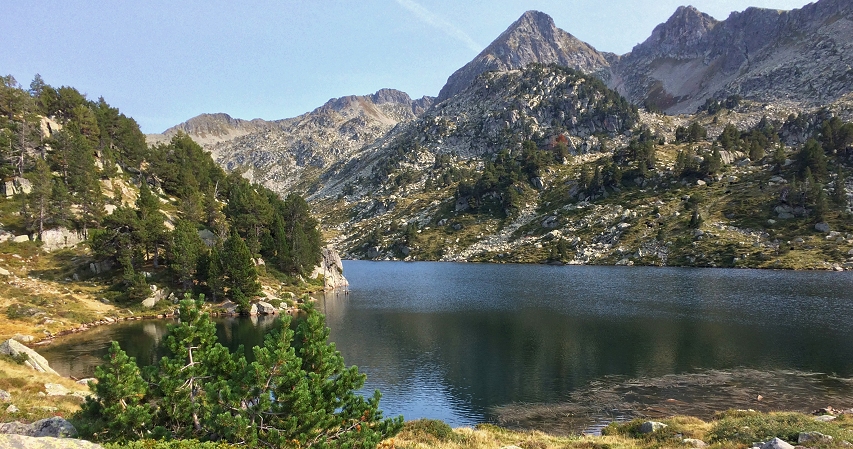
Lower Baciver Valley.
Day 7
Overnight in Benas (Benasque)
Breakfast, lunch and dinner included
After breakfast, travel by vehicle to the high pastures of the Plan de Beret from where where today’s hikes begin. Ascend a well-trodden path following the course of the Malo stream to reach the lovely Lower Baciver Lake (“Estany de Baix de Baciver”) framed by stony mountain ramparts. A longer hiking option continues beyond Lower Baciver Lake and climbs to the Upper Baciver Lakes and the sprawling meadows that carpet the floor of the Baciver Cirque. After the hikes, travel by vehicle out of the Val d’Aran and enter the valley of the Noguera Ribagorçana, the official dividing line between Aragón and Catalunya. Continue on to the mountain town of Benás in the Spanish region of Aragón. Sitting at an elevation of 3,750 feet, Benás is the principal settlement in the valley known as Valle de Benasque in Spanish, or Bal de Benás in the local language of Aragonès (spoken by only about fifteen thousand people today). Long ago, Benás was the home of Aragonese nobility. It once boasted a castle and perimeter wall, but both these have been gone for more than a century. Settle in for a three-night stay.
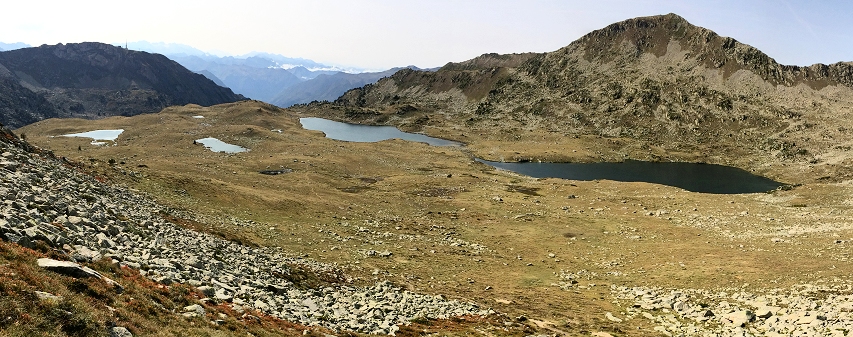
The Baciver Cirque and the Upper Baciver Lakes.

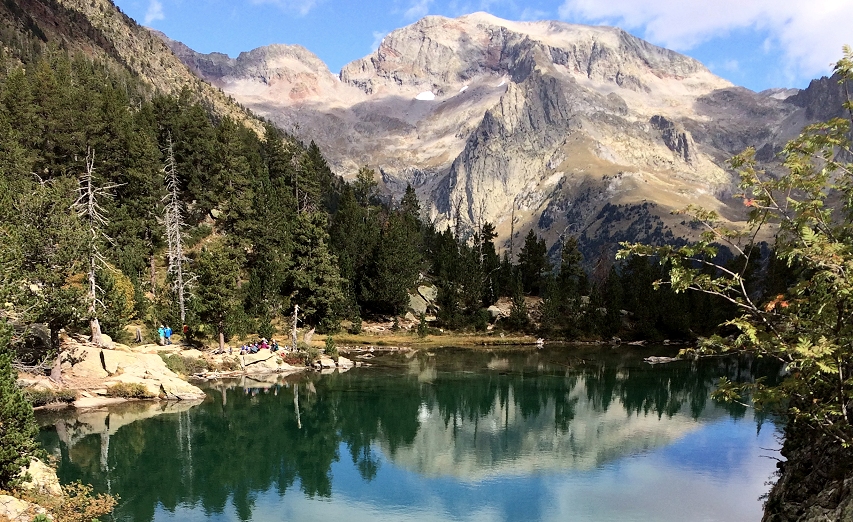
Ibon Escarpinosa and Monte Perdiguero.
Day 8
Overnight in Benas (Benasque)
Breakfast and lunch included
Spend the day exploring the trails of the Estos Valley (Bal d’Estos in Aragonès). The hikes today are within the Parque Natural Posets-Maladeta, an 82,000 acre reserve set aside in 1994 by the government of Spain’s autonomous Aragòn region. The Posets massif, which rises to over 11,000 feet in elevation, serves as the core of the western portion of the reserve. Follow the trail as is ascends the southern slopes of the Estos valley climbing to the splendid lakes that lie tucked in the Perramó basin (Bal de Perramó). Pass the pretty pond called the Ibonet de Batisielles fringed by wet meadows. A short distance beyond lies the exceptionally beautiful Ibón de Escarpinosa hemmed in by rock buttresses and back-dropped by the mass of the Perdiguero mountain. (“Ibón” means “lake” in Aragonès.) Hardy hikers can continue on a side trip beyond the Escarpinosa lake climbing into ever more open country to reach the exquisite Ibón de Batisielles from where you’ll enjoy an unobstructed view of the Maladeta massif crowned by the Pico de Aneto, the highest summit in the Pyrenees rising to 11,200 feet above sea level.
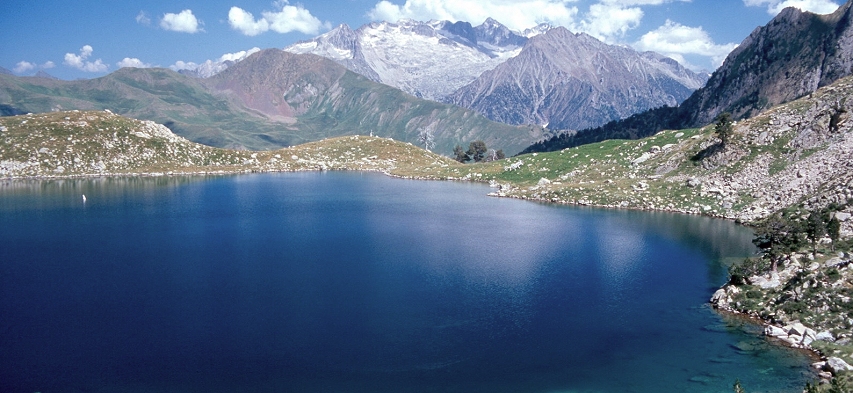
Ibon Batisielles back-dropped by the Maladeta massif.

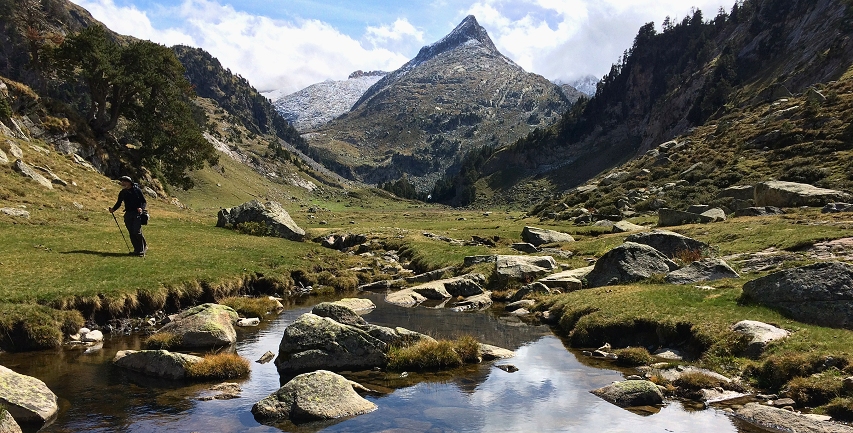
Delightful hiking in the Esera Valley near La Besurta.
Day 9
Overnight in Benas (Benasque)
Breakfast, lunch and dinner included
Travel by vehicle from Benas following the route of the Rio Ésera to the area of La Besurta in the upper reaches of the Benas valley. From here, a trail ascends to the meadows of Aigualluts before climbing gradually to the mountain pass of Col de Toro (known in the Aranès language as Còth deth Hòro). A beautiful cobalt blue lake (Lac deth Còth deth Hòro) sits in the saddle of this mountain pass that connects the Esera river valley with the Val d’Aran. Retrace the route to the starting point. If you’re up for more hiking, you can opt to continue beyond La Besurta heading down the beautiful Esera valley to the Llanos del Hospital. Enjoy a farewell dinner tonight in Benas and cap off your Spanish Pyrenees adventure!
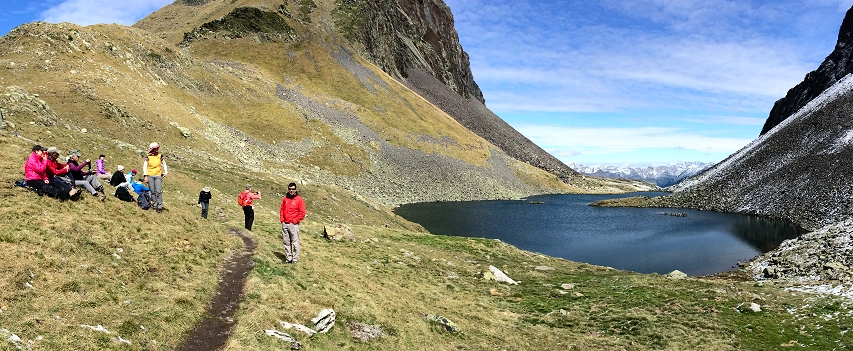
Lac deth Còth deth Hòro.

Departure day
Transfer to Barcelona, Spain
Breakfast included
After breakfast, travel by vehicle back to Barcelona. The journey will take approximately three and a half to four hours. Estimated arrival time in Barcelona is 2:00 PM. We suggest you plan your departure from Barcelona for no earlier than 4:00 PM on this day. Better yet, plan to stay a few extra days after the tour to enjoy this fascinating city! Barcelona is Catalunya’s largest city with a population of about two million squeezed into thirty-five square miles between mountains and the Mediterranean. Its noteworthy attractions include architect Antoni Gaudi’s Sagrada Familia church, and the houses of La Pedrera and Casa Battlo. In the old quarter, visit the city’s cathedral built in the “Catalan Gothic” style. And don’t forget to take a stroll on the famous, tree-lined pedestrian mall called “La Rambla” that stretches from the Plaça de Catalunya to the waterfront.
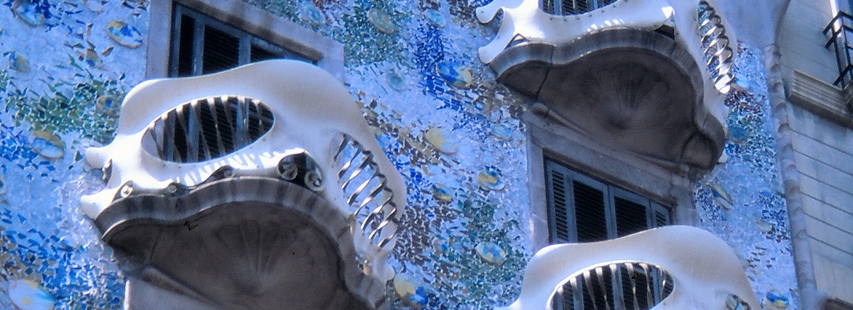
The.facade of Casa Battlo, Barcelona.

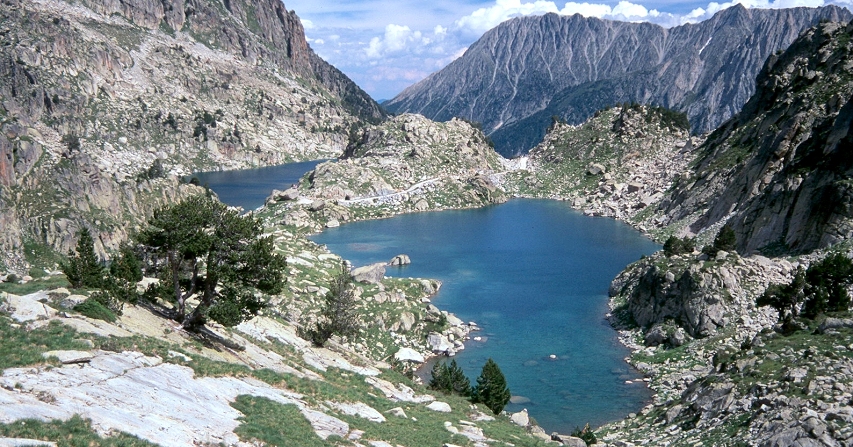
Estany dels Barbs (right) and Estany Gran d’Amitges (left), Aigues Tortes National Park.
Other Resources
Enjoy a virtual visit to the Casa de la Vall, seat of the Consell General, Andorra’s parliament.

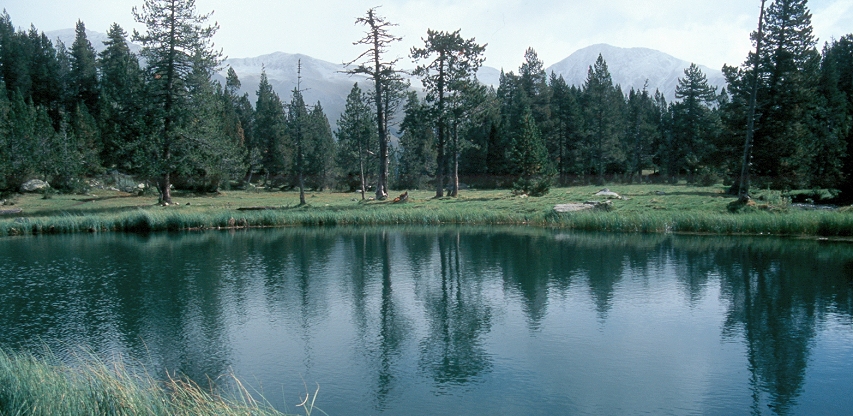
Reflections in the Ibonet de Batisielles, Parque Natural Posets-Maladeta.
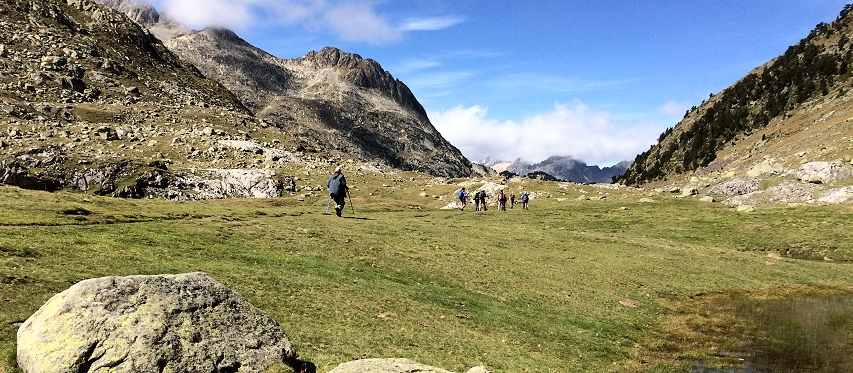
Hiking in the valley of the Riu de l’Escaleta near Benasque.

Printable version of trip itinerary
Traveling in Spain in 2024/2025: What to Expect
Pyrenees of Spain and Andorra Slide Show
Pyrenees of Spain and Andorra Slide Show for iPad and iPhone

Photos on this page are by John Osaki (© All Rights Reserved) except as otherwise credited.


